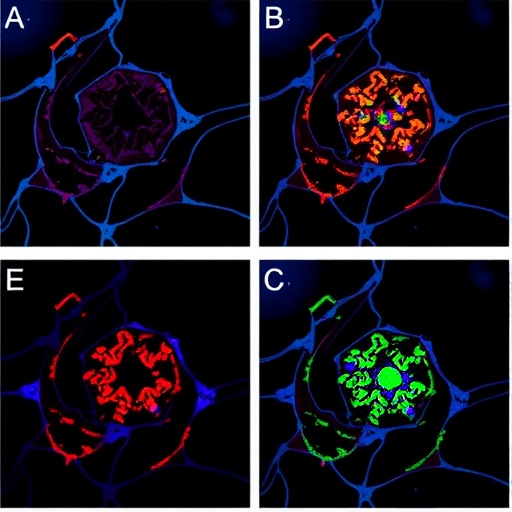In recent years, the landscape of cancer research has expanded significantly, particularly in understanding the intricate relationship between tumor cells and the immune system. A groundbreaking study authored by Lan et al. sheds light on the role of a specific protein, STAT1β, in modulating the tumor immune microenvironment in ovarian cancer. This research not only unveils the complex interplay between transcriptional activity and protein expression but also suggests a potential pathway to enhance patient outcomes. With a comprehensive analysis of both transcriptional and protein expression differences, this study stands as a beacon of hope for improving prognostic approaches in ovarian cancer.
At the heart of this study lies a crucial question: how does STAT1β influence the immune landscape surrounding tumors? The immune microenvironment is not merely passive; it plays a pivotal role in tumor progression and response to therapies. The research reveals that STAT1β acts as a significant modulator, altering the immune response in a way that could benefit patients. By examining ovarian cancer specimens, the researchers found that higher expression levels of STAT1β correlate with improved immune infiltration, indicating a robust immune response against tumor cells.
In exploring the mechanics behind STAT1β’s influence, the study delves into the intricate signaling pathways activated within the tumor microenvironment. The modulation of cytokine expressions by STAT1β leads to a more favorable immunological milieu, which could enhance the efficacy of existing therapeutic options. By integrating advanced genomic and proteomic methodologies, the research team could dissect the multifaceted roles that STAT1β plays. This detailed exploration lays a foundation for developing targeted therapies that could harness the immune system more effectively.
The implications of these findings extend beyond basic science; they touch on clinical realities faced by patients. Ovarian cancer remains one of the most lethal gynecological malignancies, and understanding the immune dynamics presents an opportunity for improving treatment strategies. In this study, researchers emphasize the need to consider immune modulation in therapeutic settings. As treatment paradigms shift towards immunotherapy, the inclusion of STAT1β as a biomarker could guide clinicians in predicting patient responses.
Moreover, the study underscores the importance of considering both transcriptional and protein expression levels when assessing the tumor immune microenvironment. Traditional approaches often focus narrowly on one aspect, leaving a gap in our understanding of how these elements synergize to influence cancer outcomes. By bridging this gap, Lan et al. present a more holistic view of cancer biology, allowing for a nuanced approach to patient care.
The findings have the potential to revolutionize how clinicians approach therapy for ovarian cancer. For instance, the knowledge that STAT1β can enhance immune infiltration opens new avenues for combination therapies. If these therapies are designed to stimulate STAT1β activity, they might amplify the immune response further, which could lead to better survival rates for patients. Clinical trials exploring this avenue could pave the way for a new chapter in ovarian cancer treatment.
As with any emerging research, there are caveats and questions that demand further investigation. The study invites additional exploration into the specific mechanisms by which STAT1β modulates the immune environment. Are there particular immune cell populations that are most influenced by STAT1β? Understanding these details could amplify therapeutic efficacy and target interventions more precisely. Such insights would also inform potential resistance mechanisms that tumors may develop in response to immune-modulating therapies.
Additionally, the research prompts consideration of how findings might vary across different subtypes of ovarian cancer. Ovarian cancer is not a monolith; various histological subtypes may respond differently to immune modulation. Future studies will need to stratify patients by these subtypes to fully assess the benefits and drawbacks of targeting STAT1β in diverse populations. This stratification could lead to personalized medicine approaches that significantly improve patient outcomes on an individual basis.
As awareness grows regarding the importance of the tumor immune microenvironment, it is crucial to facilitate interdisciplinary collaborations. A shift towards integrative oncology—merging principles from immunology, genomic medicine, and clinical practice—is essential for translating findings from studies like this one into actionable treatments. The commitment to collaboration among researchers, clinicians, and patients will ultimately drive advancements in ovarian cancer management.
The study by Lan et al. serves as a critical reminder of the potential that lies in uncovering the deep-seated connections between cancer biology and the immune system. As the research community continues to explore these relationships, the hope is that studies will lead to innovative therapies that leverage the body’s own defenses against cancer. With every discovery, we move closer to a future where ovarian cancer, once viewed as a formidable adversary, might be met with a more formidable arsenal of therapeutic strategies.
In summary, the findings regarding STAT1β’s role in modulating the tumor immune microenvironment pave the way for promising therapeutic avenues in ovarian cancer treatment. By enhancing immune infiltration and reprogramming the immune landscape, there is potential to significantly affect patient prognosis. As this research is built upon and expanded, the anticipation grows for a new wave of therapies that may offer hope to countless patients battling this challenging disease. The journey towards unlocking the potential of immune modulation is just beginning, and the implications are nothing short of transformative.
Patients, clinicians, and the broader medical community stand in anticipation of what the future holds as research continues to evolve towards more precise and effective treatments. The commitment to understanding and manipulating the tumor microenvironment underscores the resilience of scientific inquiry and the unwavering quest for solutions to the challenges posed by cancer.
Subject of Research: Modulation of the tumor immune microenvironment in ovarian cancer by STAT1β
Article Title: STAT1β modulates the tumor immune microenvironment to improve prognosis in ovarian cancer: a comprehensive study of transcriptional and protein expression differences.
Article References:
Lan, N., Li, X., Qiao, Y. et al. STAT1β modulates the tumor immune microenvironment to improve prognosis in ovarian cancer: a comprehensive study of transcriptional and protein expression differences.
J Ovarian Res 18, 192 (2025). https://doi.org/10.1186/s13048-025-01780-6
Image Credits: AI Generated
DOI: 10.1186/s13048-025-01780-6
Keywords: Ovarian cancer, STAT1β, immune microenvironment, prognosis, transcriptional expression, protein expression.




